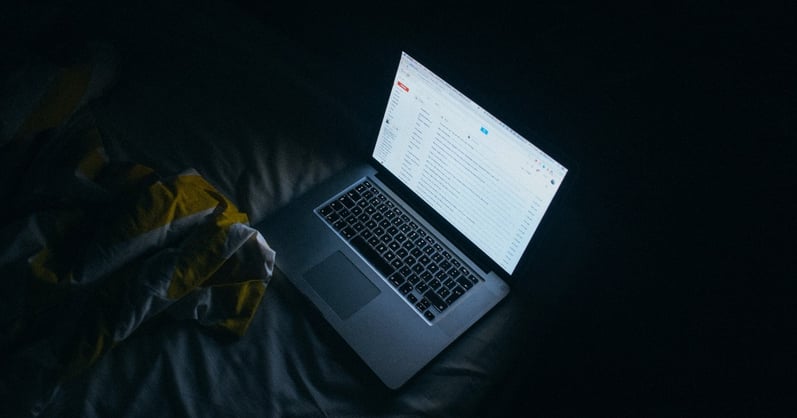Ditch the Digital Devices
Published on: September 14, 2023 | Reading time: 🕐 5m

Most of us know that scrolling on our smartphones or watching Netflix in bed is not good for our sleep. But this doesn’t necessarily mean that we tuck our phones away and reserve TV watching for the living room. Why is it that we are reluctant to give up our digital devices before bedtime or in the bedroom? Perhaps it’s because we’re a bit fuzzy on exactly how digital devices interfere with sleep.
The thing about digital devices is light, particularly blue light. To explain how blue light exposure before bed affects sleep, first, let’s take a look at how light and darkness, in general, are linked to our sleep-wake cycle.
Exposure to light plays a central role in the body’s natural circadian rhythms. A circadian rhythm is any biological process that oscillates (rises and falls) every 24 hours. Examples include body temperature, blood pressure, hormone levels, and our sleep-wake cycle (the alternating periods of sleep and wakefulness that we all experience). When light enters the eyes through the retina, it transmits an electrical signal to the suprachiasmatic nucleus (SCN) of the brain. This brain structure acts as our central circadian pacemaker, helping to synchronize the body’s circadian rhythms with our environment.
In darkness, the SCN signals the pineal gland (a nearby brain structure) to produce melatonin–a hormone responsible for regulating our sleep-wake cycle. When melatonin is produced, it causes physiological changes in the body that promote sleep, such as decreased body temperature. Melatonin levels peak during nighttime hours when our exposure to light is at its minimum. During the day, when exposure to natural light is much higher, the SCN signals the pineal gland to turn off melatonin production. This then stimulates wakefulness in the morning and helps maintain alertness throughout the day. Our SCN sets the body’s sleep-wake cycle according to Earth’s night-day cycle.
What happens when we expose ourselves to large quantities of light leading up to bedtime? Research has shown that like natural light, artificial light suppresses the secretion of melatonin. This can cause a delay in our circadian rhythms and throw our sleep-wake cycle out of whack. For instance, a group of researchers at Harvard Medical School found that reading on a digital device before bedtime resulted in lower levels of melatonin at bedtime and a 1.5-hour delay in peak melatonin levels the next day. It also led to higher levels of alertness before bed, increased time to fall asleep, less rapid eye movement (REM) sleep (the stage of sleep in which most dreaming occurs), and more difficulty waking up the next day.
Although all artificial light can interrupt the body’s circadian rhythms, blue light seems to have particularly strong effects. Blue light, which is part of the visible light spectrum, has a very short wavelength and high energy level. Our eyes naturally let in a lot of blue light, which makes our bodies particularly sensitive to its effects. It doesn’t help that we are bombarded with blue light–it is everywhere! Not only is sunlight a source of blue light, but many human-made devices emit high concentrations of blue light. These include electronic devices, digital screens (e.g., TVs, computers, smartphones), and fluorescent and LED lighting.
But is all blue light bad? No. As mentioned above, natural light from the sun, some of which is blue light, is important in regulating our circadian rhythms. Blue light is also helpful for boosting attention, reaction times, memory, and mood. This is great for daytime functioning. However, light exposure before bedtime has become a major problem in our society and may even be wreaking havoc with your sleep-wake cycle.
As a general guideline, try to minimize your exposure to blue light in the evening and avoid all digital screens for at least 1 hour before bedtime. This will ensure your body has ample opportunity to produce melatonin in preparation for sleep. You may also want to consider the following:
- Remove all digital devices from your bedroom, including your phone. If you use the alarm function on your digital device, consider having it ring from another room or switch to a mechanical alarm clock.
- Use dim light or red light in the evening. Red light has been shown to have the smallest effect on circadian rhythms.
- Incandescent bulbs emit much lower concentrations of blue light compared to LED bulbs. So although they are less energy efficient, incandescent bulbs are a better choice for your nightstand.
- If reading is part of your nighttime routine, choose a real paper book over an eReader or electronic device and read it in dim or red lighting.
- If you cannot limit exposure to blue light at night, use a method to block its wavelengths. For instance, there are blue-light-blocking glasses that you can wear, filtering screens for devices, and blue light-filtering software and apps.
- Expose yourself to bright light during the day. This will help strengthen your circadian rhythms and will boost your alertness and mood for good daytime functioning.
Read more: The Nature and Function of Sleep
Need help with your sleep?
We can help you! HALEO offers a solution that can contribute to productivity and well-being through quality sleep. Schedule a discovery meeting by booking your time here.



